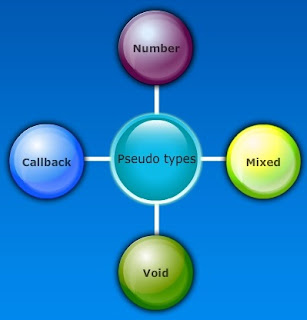Pseudo Types
- Pseudo types are data types used in PHP documentations to explain certain features.
- They do not really exist.
- In PHP programming syntax, you would be seeing pseudo types as follows

Number
- Number is a pseudo type, which means that a parameter is either an integer or a float.
- To use octal notation, precede the number with 0
- To use hexadecimal notation, precede the number with Ox
- To use binary notation, precede the number with Ob
Note: Binary
integer literals are only available since PHP 5.4.0.
Example:
<?php
$a = 1234; //
decimal number
$a = -123; // a
negative number
$a = 0123; //
octal number (equivalent to 83 decimal)
$a = Ox1A; //
hexadecimal number (equivalent to 26 decimal)
?>
Mixed
- A Mixed indicates that a parameter may accept multiple (but not necessarily all) types.
- Mixed simply means an integer or a float or a string or a bool, etc.
Void
- A void as a return type means that the return value is useless. void in a parameter list means that the function doesn't accept any parameters.
Example:
<?php
$txt="Hello
world!";
echo $txt;
$my_name =
'Raju';
?>
Callback
- call_user_func() and usort() are predefined functions. These two functions and some other predefined functions can take the name of a function as a parameter. Any function whose name goes as a parameter to these functions is called a callback function. I will use only the call_user_func() function to illustrate the behavior of a callback function.

